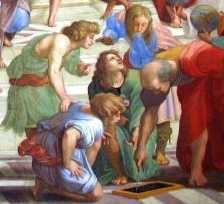Lentini's title: With the night chant, we implore thanks also for the day
O sator rerum, reparátor ævi,
O founder of all things, renewer of time,
Christe, rex regum, metuénde censor,
Christ, King of kings, fearful magistrate,
tu preces nostras paritérque laudes
Thou our prayers and equally our praises
súscipe clemens.
receive with mercy.
2. Noctis en cursu tibi vota laudum
Lo, through the course of the night to Thee vows of praise
pángimus; præsta tibi sint ut apta,
we compose; grant that they may be suitable to Thee,
nosque concéntu réfove perénni,
and refresh us by our continual singing,
lúminis auctor.
Author of light.
3. Da dies nobis probitáte faustos
Grant to us in uprightness prosperous days
mortis ignáram tribuéndo vitam,
granting us a life ignorant of death,
semper ut nostros tua sit per actus Update: (Thanks again, Figulus)
That always unending glory may be thine
glória perpes.
through our actions.
4. Ure cor nostrum, pius ure lumbos
Burn our heart, in your love burn our loins
igne divíno vigilésque nos fac,
with fire divine and make us vigilant,
semper ardéntes mánibus lucérnas
that always, burning lamps in our hands
ut teneámus.
we may hold.
5. Æqua laus summum célebret Paréntem
Let equal praise glorify the highest Father
teque, Salvátor, pie rex, per ævum;
and Thou, Savior, Holy King, through all time;
Spíritus Sancti résonet per omnem
and let the glory of the Holy Spirit resound through
glória mundum. Amen.
all the universe.
Though the tenth century author is unknown, according to Lentini, this hymn "was very widespread in the middle ages, for the Feast of the Transfiguration, remembered in vs. 3, here omitted." These are verses 1, 2, 5 and 6 of the hymn, with a doxology for the last verse.
In verse 4, pius ure is a replacement for iecur atque. Again with the liver as the seat of feelings. Iecur atque lumbos: the liver and the loins. This is the second hymn I have encountered (the first being Saturday's Office of Reading noctu hymn (Odd week)) in which these two terms appear together, both times asking God to "burn" them with holy, cleansing fire. Yet Lentini, the modern editor, takes out iecur (liver) but leaves in lumbos (loins). I guess with Vatican II, there was an attempt to bring the details of the Church's teaching in line with modern medical science and psychology, a laudable intention in and of itself. Perhaps he reasoned, correctly, that we have no scientific evidence that the human liver is the "seat of feelings." (A surgeon, however gives a compelling description of handling a liver that might convince you otherwise.)
Linguists tell us many indigenous languages still today describe the liver as the seat of volitile emotions like anger or sadness. Alice Gaby of the Univ. of Melbourne describes some of the best examples(and perhaps why they don't always translate to English well):
A furious person is described in Kuuk Thaayorre as 'hot-livered'. The Papua NewWhat about the "loins" then? I think there might be more general agreement, if not scientific evidence, about the pelvic region being the location of sexual excitement, (despite what Dr. Oz might say to Oprah about the brain being the biggest sex organ).
Guinean language Mbula also uses the compound 'hot-liver' to describe someone
who's very angry. Similarly, in Turkmenistan, people describe making somebody
angry as 'burning their liver'...In Kambera, spoken on Sumba Island in
Indonesia, a pounding liver is a symptom of worry...In Kuuk Thaayorre, for
example, a brave person is strong-livered. Although this doesn't really
translate into English, we nevertheless have a negative association between the
liver and bravery, lexicalised in the antonym of bravery: 'lily-livered'.
Hence, Lentini's imperitive: lumbos can stay, but iecur has got to go. In any case, we are still asking God to burn our bodies and souls with his holy fire, because these urges and feelings and rages and passions that come over us all feel so strong and compelling, that it must take something as strong and painful as the fire of God to burn them out and cleanse them, so that our bodies and souls might be pure vessels once again.
My own experience of the Holy Spirit's fire is this: the fire is warm, but can be powerfully hot, to the point where it can be painful, but is always gentle, and it heals you to an incredible degree. It is spiritual in origin, but can have mental, emotional and even physical effects. You can ask for it, but it doesn't come "on demand." Occasionally it shows up even if you don't specifically ask for it. I don't seek out charismatic spiritual experiences as I once did, but I cannot deny the reality of the fire of God which still visits me now and again.

2 comments:
semper ut nostros tua sit per actus
glória perpes.
That always unending glory may be thine through our actions.
"Actus nostros" is accusative, and "gloria perpes" is nominative, as is "tua".
I had a lot of trouble with this passage. I tried all sorts of configurations and permutations of it.
I like your solution A LOT. It seems so simple now.
Post a Comment